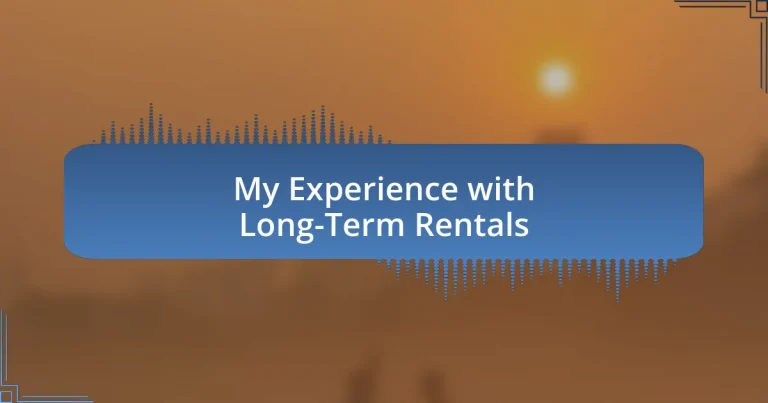Key takeaways:
- Long-term rentals offer stability, financial predictability, and foster a sense of community, enhancing tenant satisfaction.
- Carefully assess properties based on location, neighborhood vibe, and landlord responsiveness to ensure a positive living experience.
- Understanding and negotiating rental agreements is crucial for ensuring tenant comfort and secure living conditions.
- Building strong tenant relationships through communication and engagement can lead to longer tenancies and a supportive rental environment.
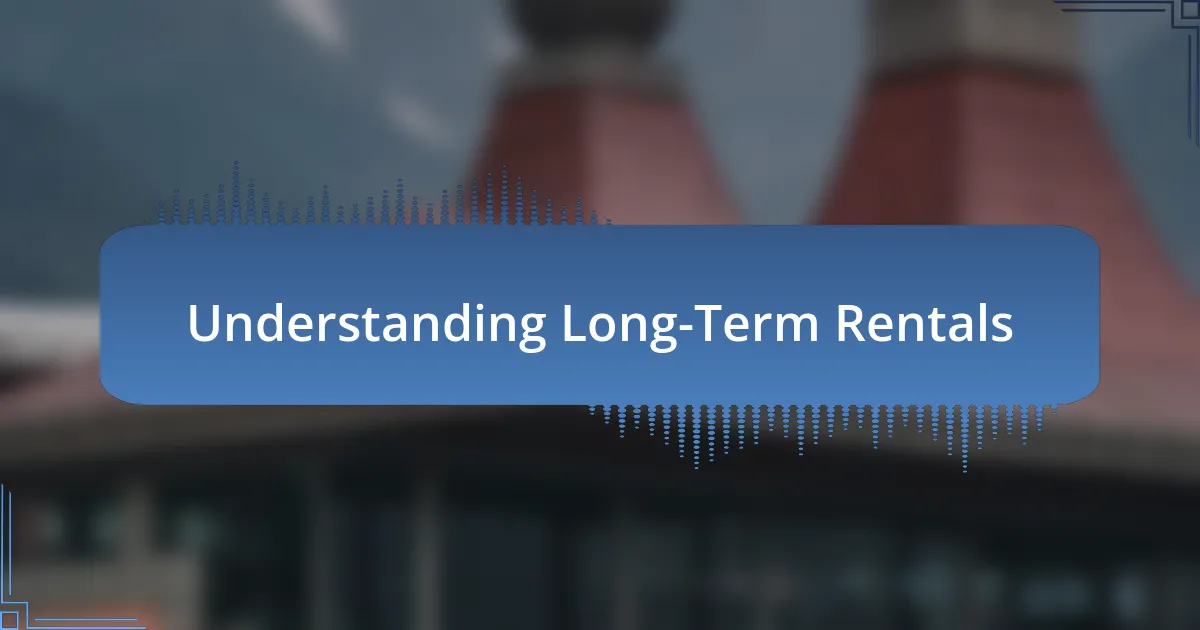
Understanding Long-Term Rentals
When I first considered the world of long-term rentals, I was surprised by the stability they offer. Unlike short-term rentals that often feel more transient, long-term rentals create a sense of community and permanence that can be deeply comforting. Can’t you feel more at home when you settle into a space for a longer period?
In my experience, one of the most significant aspects of long-term rentals is the financial predictability they provide. Knowing your monthly expenses allows for better budgeting and planning. I remember when I secured my first long-term rental; the peace of mind from having a fixed monthly rate was invaluable. It shifted my focus away from the uncertainty often tied with short-term leases.
Moreover, building a relationship with landlords in long-term rentals can lead to a more personalized living experience. I recall how my landlord was always willing to adjust minor maintenance issues promptly, enhancing my comfort in the home. This connection not only fostered trust but also made me feel valued as a tenant—something I believe is often overlooked in fleeting rental arrangements.
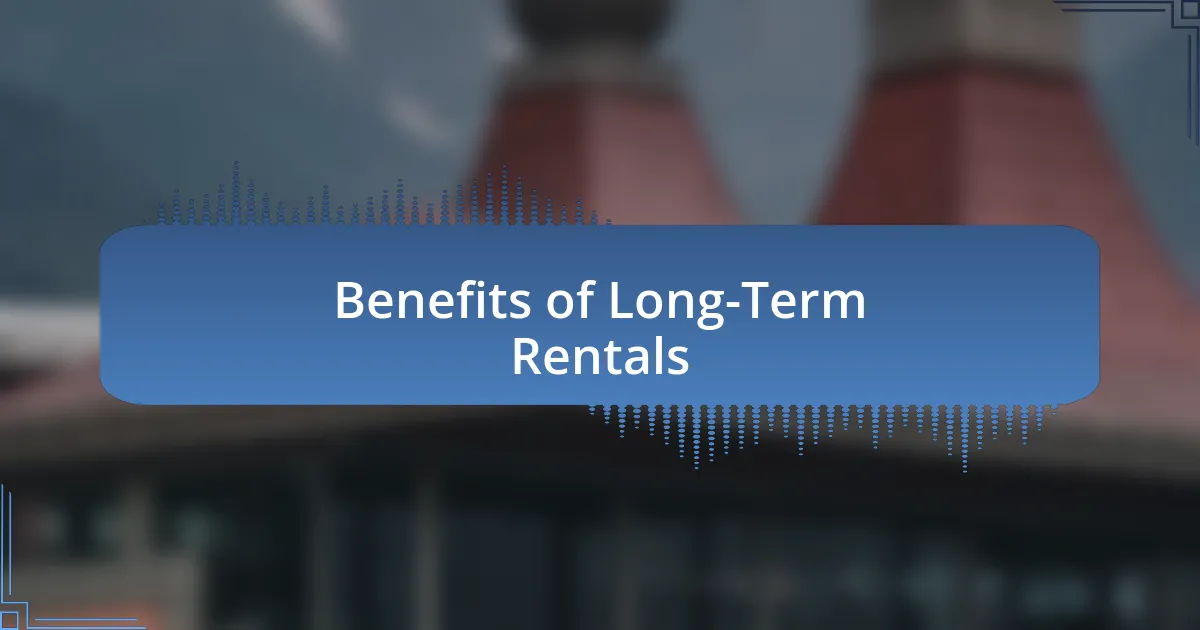
Benefits of Long-Term Rentals
When it comes to the benefits of long-term rentals, the sense of security they provide is unparalleled. I vividly remember the relief I felt when I signed my long-term lease; it was a solid commitment that allowed me to truly personalize my space. Without the constant worry of looming lease renewals or fluctuating rental prices, I could finally settle down and make that house a home.
Here are some key benefits I have experienced:
- Stability: Long-term rentals encourage deeper roots in the community, allowing relationships with neighbors to blossom over time.
- Financial Predictability: Knowing your rent for an extended period helps create a sustainable budget without unexpected fluctuations.
- Personalization: The freedom to modify your living space fostered a deeper connection to my environment, something often restricted in short-term rentals.
- Loyalty Benefits: Many landlords offer perks or incentives to long-term tenants, enhancing the living experience and often providing maintenance options that cater to your needs.
Overall, the emotional aspect of feeling genuinely settled cannot be overstated; it transformed my daily routine, making the home environment a haven instead of just a temporary stop.
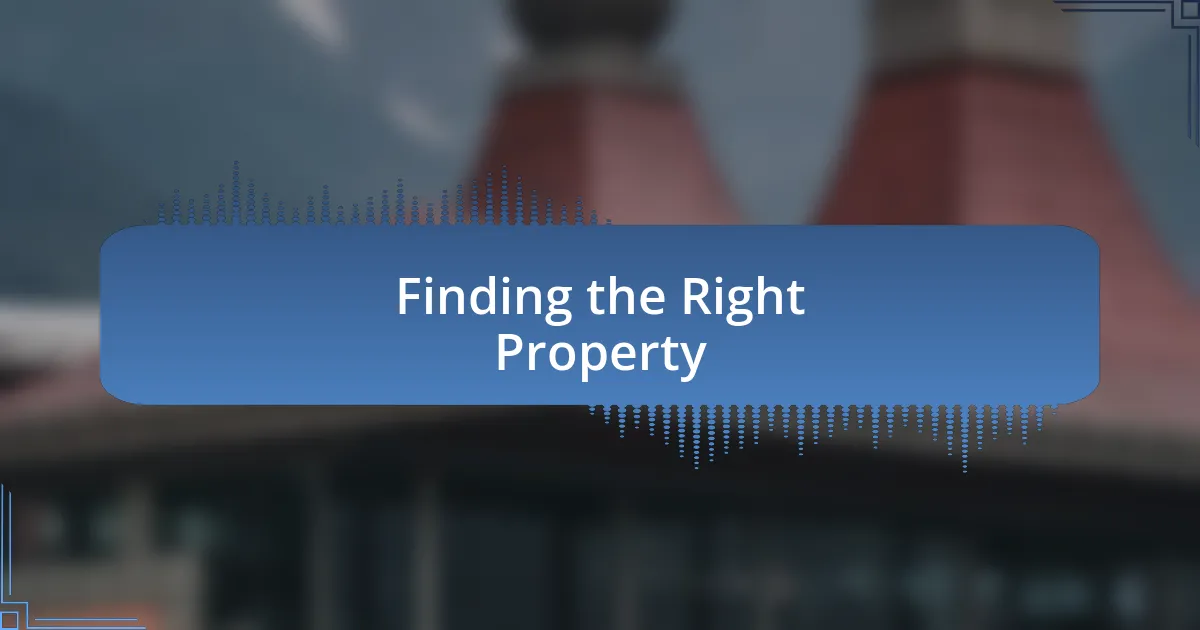
Finding the Right Property
Finding the right property for long-term rentals is a journey that requires careful consideration. I remember the excitement mingled with anxiety when I started my search. I had a clear list of must-haves, including proximity to public transport and a pet-friendly policy, which helped narrow down my options significantly. Keeping track of these criteria not only streamlined the process, but it also ensured I wouldn’t compromise on my essential needs.
While location is often at the forefront of finding a property, I learned that the overall neighborhood vibe plays a crucial role. I once overlooked an area I thought would be too quiet, only to discover vibrant local cafes and art studios thriving in its midst. It became my favorite hang-out spot, proving that sometimes, let your heart guide you to unexpected finds on the journey.
Additionally, I believe it’s essential to evaluate potential landlords or management companies. A responsive and fair landlord can make a world of difference in your rental experience. I’ve had my share of encounters, and the ones who genuinely cared about their tenants’ comfort and wellbeing were the ones I appreciated the most. Don’t hesitate to ask fellow tenants about their experiences; it’s a critical layer of insight I wish I had considered earlier.
| Criteria | My Experience |
|---|---|
| Location | Essential for convenience; nearby amenities enhance living quality. |
| Neighborhood Vibe | Unexpected gems can turn a quiet area into a lively community. |
| Landlord Interaction | A good landlord makes the living experience worry-free and enjoyable. |
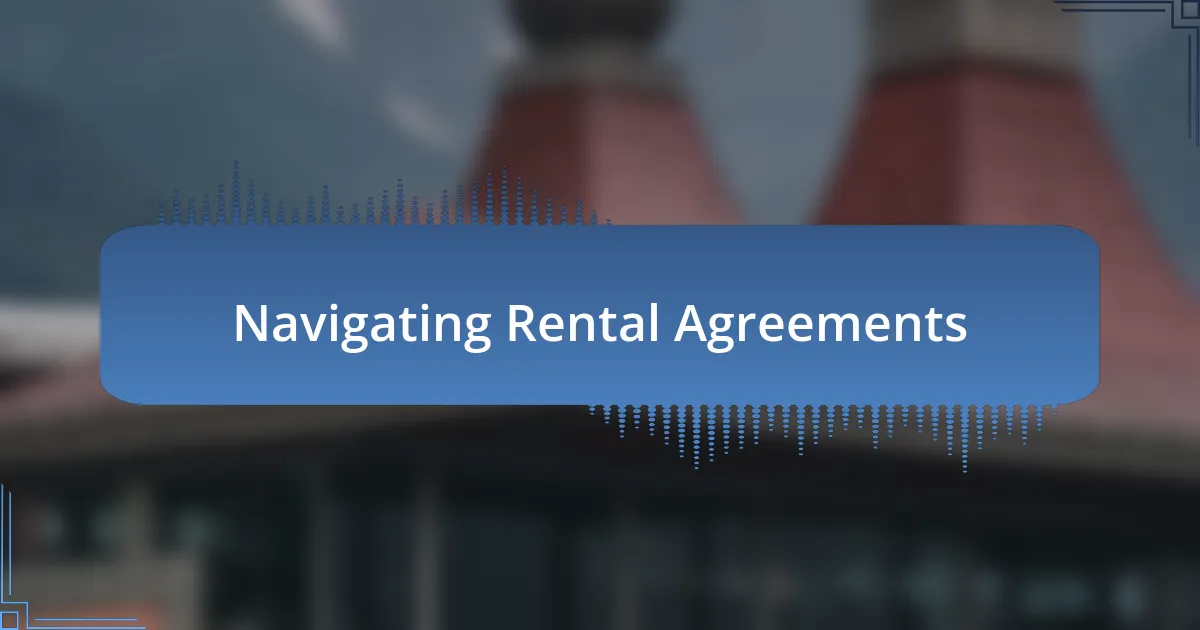
Navigating Rental Agreements
Navigating rental agreements can feel like deciphering a foreign language. I still remember sitting across from my landlord, clutching the lease with a mix of excitement and confusion. As we went through each clause, I asked questions about everything from maintenance responsibilities to lease termination, ensuring I wasn’t signing away my rights without understanding the implications.
There’s often a lot of fine print that can easily be overlooked. I once skipped reading about the rules concerning security deposits, only to discover later that my landlord had a complex policy regarding deductions. My advice? Take your time and don’t hesitate to ask for clarifications. After all, will this agreement truly work for you if you don’t grasp every detail?
I learned firsthand the importance of negotiating terms to suit your needs. When I signed my latest lease, I managed to negotiate a slightly lower rent in exchange for agreeing to a longer commitment. It felt empowering to advocate for myself, and it made settling into my new home feel all the more rewarding. I always wondered, how can anyone feel fully comfortable without a strong grasp on their agreement? The answer is they can’t, so prioritize understanding every aspect of your rental terms.
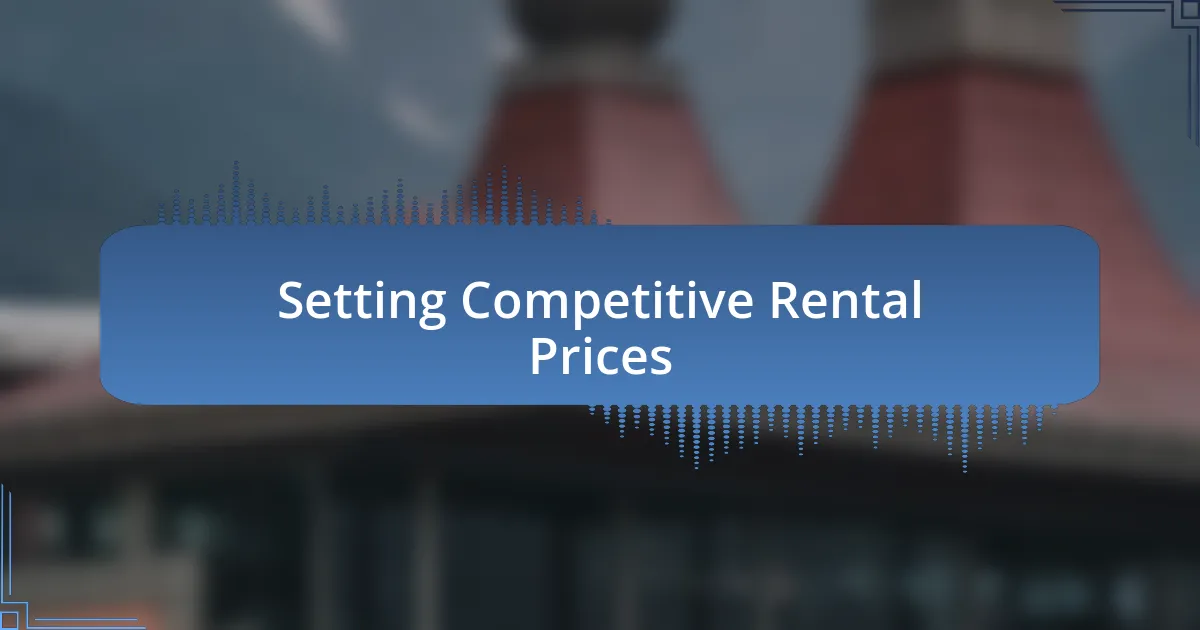
Setting Competitive Rental Prices
Setting the right rental price is crucial for attracting tenants while ensuring you’re not underselling your property. When I first started renting out my apartment, I nervously checked the listings in my area, analyzing what others were charging. It struck me that underpricing could lead to missed income, while overpricing might leave my unit vacant for far too long.
I remember the moment I adjusted my price based on local market trends. After conducting thorough research, I found that a slight reduction in rent actually increased my interest from potential renters. I can’t emphasize enough how important it is to keep an eye on competition. Do you ever wonder how much your location plays a role in rental prices? From my experience, factors like proximity to public transport or popular amenities can create a significant difference.
Ultimately, I found that being flexible with pricing during off-peak seasons made a real difference in occupancy rates. In my case, I offered temporary discounts which not only filled my unit faster but also led to excellent long-term tenants. So, have I learned my lesson? Absolutely—staying informed about the rental market can empower you as a landlord and ensure you’re making the most of your investment.
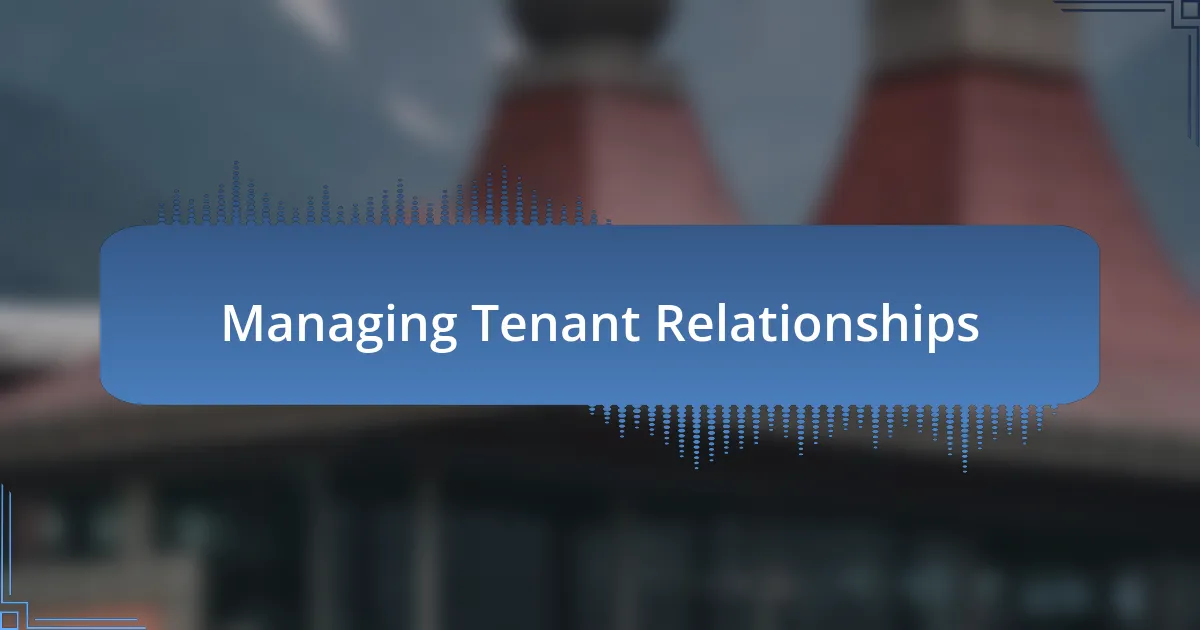
Managing Tenant Relationships
Building strong relationships with tenants is key to a successful rental experience. I’ve found that open communication often sets the foundation for mutual respect. Early on, I made it a point to introduce myself in person and share my contact information—something as simple as a friendly conversation can go a long way in making tenants feel comfortable and valued.
It’s fascinating how a little bit of effort can enhance tenant satisfaction. For instance, I once organized a small gathering for my tenants to meet each other and discuss any concerns in a casual setting. The feedback was overwhelming; they appreciated the opportunity to connect with me and with one another. Have you ever thought about how creating a sense of community can lead to happier tenants? From my perspective, fostering that environment not only leads to better communication but often results in longer tenancy.
When challenges arise, as they sometimes do, I lean into transparency and responsiveness. There was a time when a maintenance issue occurred late at night. Instead of waiting until morning, I took the initiative to call my tenant and assure them I was looking into it. I believe that managing expectations in difficult moments can build trust. In my experience, tenants are generally more understanding when they feel heard and recognized, transforming potentially tense situations into opportunities for strengthening our relationship.
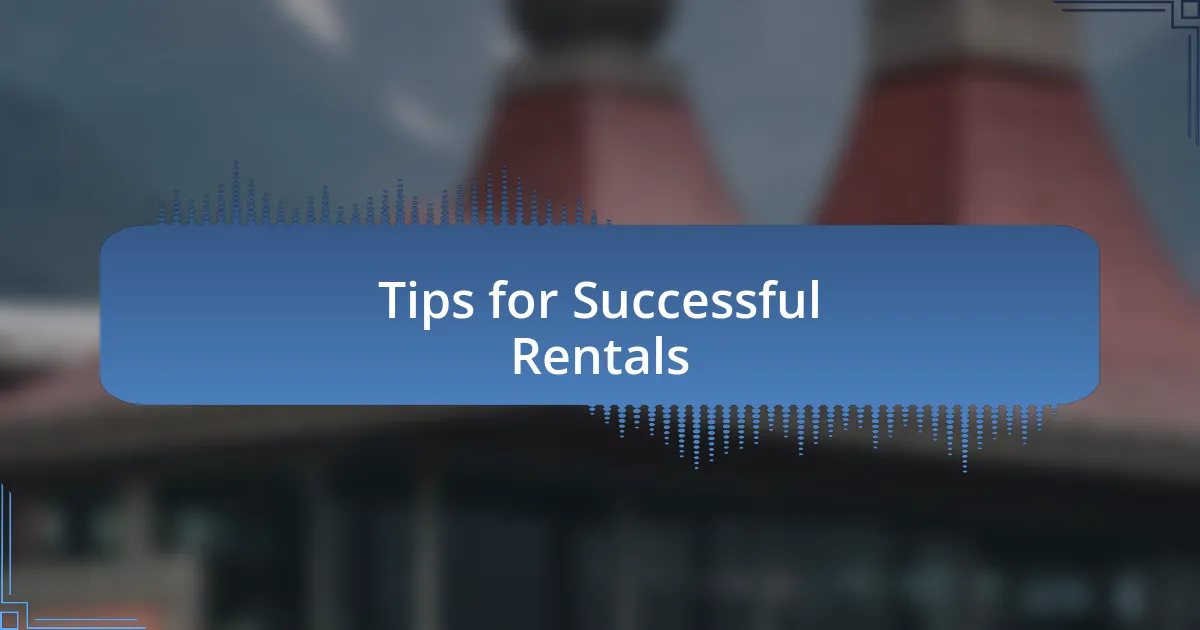
Tips for Successful Rentals
Creating a positive atmosphere starts with well-defined expectations. I remember when I first rented out my property, I laid out clear guidelines about maintenance requests and payment timelines. Having that framework in place made both my life and my tenants’ lives significantly easier. It’s a simple step, but have you noticed how clarity can prevent misunderstandings?
Regular property maintenance is crucial in showing tenants that you care about their living space. One time, I took the initiative to upgrade the landscaping around the building. When the tenants noticed fresh flowers and trimmed bushes, I could see the smiles on their faces. It made me realize that small improvements can lead to a big boost in tenant satisfaction and feel like valued members of a well-maintained community.
Staying engaged during the rental period is essential. I send out seasonal check-ins with practical tips—whether it’s preparing for winter or local events. This not only keeps communication open but also shows that I’m genuinely invested in their experience. Have you ever received a thoughtful note from someone? That’s the kind of appreciation I aim for, reinforcing that we’re in this journey together.
